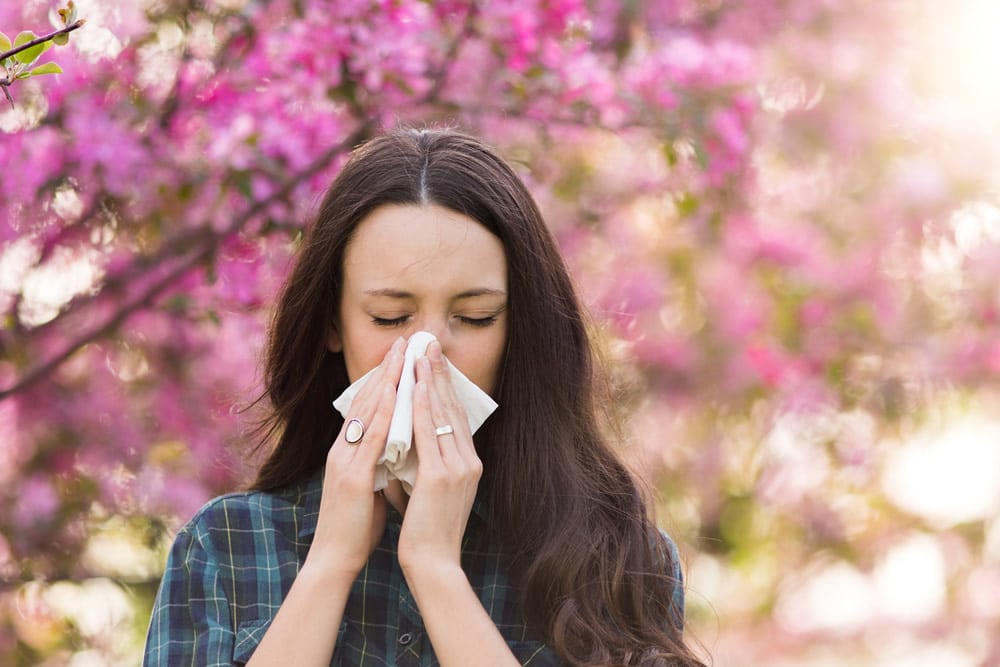April 1, 2019

Here in the UK, Spring seems to finally be here and the quest for sunny days and getting out and about, begins. So does the annual misery for many people, that of allergies such as hayfever and pollen reactions.
April sees Allergy UK highlighting a many allergy issues with Allergy Awareness Week 29th April – 3rd May 2019. This year they are focussing on air quality and the allergens around us. The aim is to show that it isn’t just pollen and dust that are major causes of allergies, but that things like air quality and pollution are affecting people too. 5.4 million People in the UK are currently receiving treatment for asthma: 1.1 million children (1 in 11) and 4.3 million adults (1 in 12). (Asthma UK, 2017)
It’s not just asthma, allergic conditions can show up as skin conditions, digestive problems from food allergies and the most severe of all, anaphylaxis. Anaphylaxis-type reactions occur in approximately 1 in 1000 of the general population and must be treated as a medical emergency, many people will carry an epi-pen with them to administer adrenaline. This type of reaction can be life threatening, although many family members are aware what to do if someone goes into anaphylactic shock, co-workers may not know what to do. If you work with someone with this type of reaction, make sure you know what to do, your calmness and quick actions could save a life.
Many people will have to avoid certain food, topical creams, perfumes and more to help deal with allergies, but are there supplements and other lifestyle changes you can use that might also help alleviate the symptoms and help your body cope?
5.4 million People in the UK are currently receiving treatment for asthma: 1.1 million children (1 in 11) and 4.3 million adults (1 in 12). (Asthma UK, 2017)
When it comes to pollens and airborne pollutants, it is extremely hard to avoid them, but there are steps you can take to help minimise your exposure. Allergy UK are going to focus on making people aware of simple ways they might be able to help create clean air. Things like walking instead of driving, using public transport instead of taking a car and buying local to reduce air miles. Actions like this can be done by anyone, whether they suffer from allergies or not. Plus, it makes cleaner air for all of us.
The symptoms can include itchy eyes and throat. Sneezing and a blocked or runny nose, headaches and sinus pain and watery red eyes. Some sufferers will also experience shortness of breath and tiredness too.
If you suffer from hayfever (allergic rhinitis) and around 20% of the UK population do, there are some simple steps that can help you reduce your suffering. Remember, it is not just pollen that can be causing your symptoms, it can be dust, dust mite and animal hair too.
A lot of people dislike taking over the counter remedies for hayfever as some of them can cause drowsiness. So, are there natural alternatives that might be able to help reduce symptoms without side effects?
The good news is that there are a number of nutrients and natural compounds that may help your body cope with the symptoms and reactions. Of course, avoiding the allergens is the key action, but that is not always possible. Here are just a few that are worth investigating.
You might think of stinging nettles as something that can cause a reaction, rather than help deal with one, but studies have shown that using Urtica dioica can help inhibit several key inflammatory events that can cause the symptoms of seasonal allergies.
Another plant that has seen increasing popularity outside it’s traditional use in Ayurvedic medicine, is Tinospora cordifolia, also known as Guduchi, is a large deciduous climbing shrub. Amongst the active principles that have been extracted are alkaloids, steroids, diterpenoid lactones and glycosides. Research has discovered that these compounds have a wide range of properties, the ones that are of most interest to the allergy sufferer are the antioxidant, anti-allergic, anti-inflammatory and immunomodulatory actions.
The mineral zinc plays a role in over 300 processes in the body, including specific roles in the immune system.
We hear a lot about having a good gut flora and maintaining the balance and diversity of the bacteria in our digestive system. Research is showing us that these good bacteria are involved in so much more than digestive health. The gut brain connection is featuring in a lot of current research as is the role these bacteria play in the immune system. One such strain is Bifidobacterium longum BB536, studies have shown that it may help the allergic response with regards to seasonal allergic rhinitis. Certainly, an area of research to watch.
Often used as a culinary herb in Asian cooking, the aromatic herb Perrilla frutescens has a long history of use in Chinese medicine and is not appearing in a many Western supplements too. It is naturally rich in rosmarinic acid, which may help soothe irritated eyes and an itchy nose.
The mineral zinc plays a role in over 300 processes in the body, including specific roles in the immune system. Research has shown that taking zinc when exposed to pollen can help dampen the allergic response to grass pollen.
Looking at your diet, many people find that reducing dairy intake can make a difference as it can be mucous forming for some people. Others find that if you have a spoonful of a local honey every day, help them to desensitise to local pollens, just start slowly as this can aggravate symptoms for some people.
By being aware of pollen counts, what makes you worse, your diet and consider taking the right supplements can all make a big difference to how you get through the hayfever season.
Back to Blog